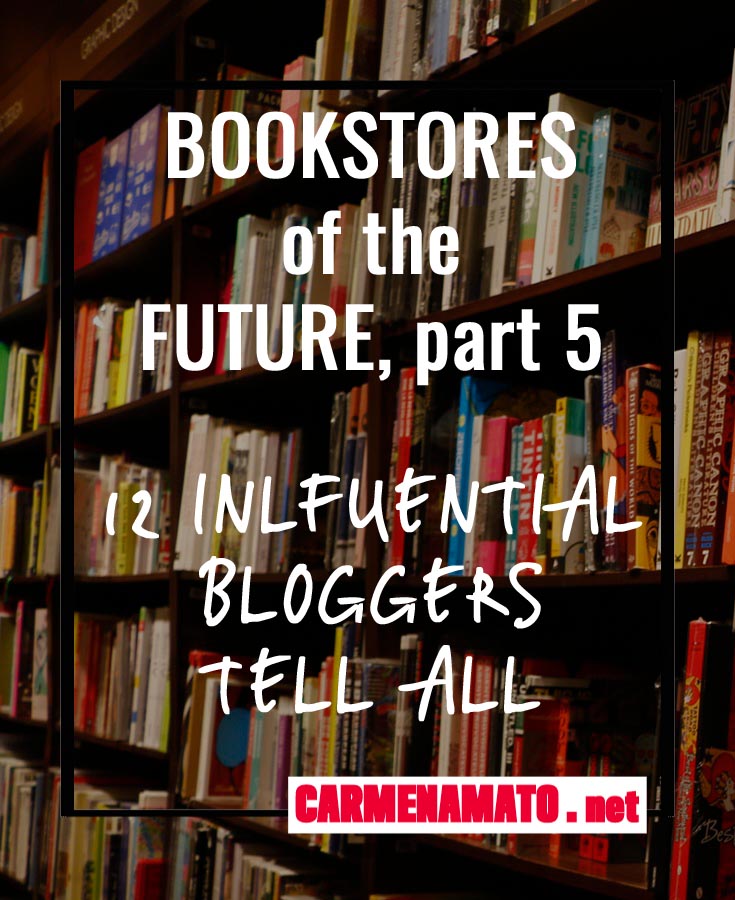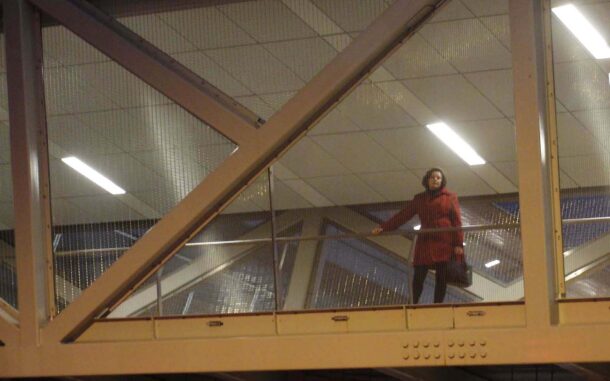What will be the future of bookstores? Many brick-and-mortar bookstores, including the US-based Borders chain, have closed in recent years, unable to compete in the era of ebooks and ecommerce. Yet bookstores are talked about in terms of being an “oasis,” a magical place of discovery, the place where we all want to spend hours sipping coffee and browsing.
But not necessarily buying.
The big question
So how can bookstores innovate in order to stay relevant and solvent?
Over the past few months, I’ve asked this question of authors, book bloggers, store owners, and publishers. The result is a series of articles featuring responses from each group. The first article, with 25 author comments, including those from thriller author Dale Brown and Guy Kawasaki, author of ENCHANTMENT, was a real eye-opener and my most widely shared blog post (I’ve stopped counting). Read it here.
Book bloggers
Book bloggers occupy a unique position in the discussion, in that 20 years ago, there was no such thing as a book blogger. Theirs is a trade that has grown up with ebooks and ecommerce and is increasingly influential. Yet few would say that we no longer need bricks-and-mortar bookstores.
Many say, however, that we need different bookstores than the ones we have today. Read on to see how the debate shapes up. Note: comments organized in alphabetical order by blogger last name.
Rebecca Rego Barry, http://www.finebooksmagazine.com/fine_books_blog/
In thinking about your questions, I kept returning to a set of ideas I put forth back in March on our blog. The post was called “Ten Reasons a Pessimist Can be Optimistic About the Future of the Book.” It was based on a talk I gave at a university library earlier in the year. Several of these points remain relevant. For example, craftsmanship — in general and in book publishing specifically — has made a comeback. To me, that bodes well for the future of new books. Yes, some books can and should go straight to digital, but for the ones that don’t, publishers will have to put more thought into art, design, and packaging; making the book an experience separate from a text to be read. Publishers like Siglio and McSweeneys are doing this. So I would predict that the new bookstore of the future will be smaller, but the books will be better — well-designed, even hand-made, illustrated, and/or innovative.
I almost exclusively cover used, rare, and antiquarian books, and there I see two things. One is the need for solid relationships between buyers and sellers. The Internet very nearly killed off the smaller antiquarian shops (some of whom then became Internet-only dealers), and so book fairs and catalogue sales largely fill in that gap. In some cases, booksellers have closed (appointment-only) shops. All of this makes it more time-consuming for collectors to find the best material–and yet, even with those obstacles, the trade is strong and the base is committed. Quirky shops like the Monkey’s Paw in Toronto, stocking odd & unusual books and ephemera of various prices is a neat concept, and I’d love to see more of that in the future. And Two, the big, get-lost-in-the-stacks shops like the Strand and Powell’s will still be with us in 25 years for the simple reasons that the books are usually cheap and the thrill of discovery provides something akin to a contact high for many readers. (email to author, 8 December 2013)
Richard Bilkey, http://fictionetal.wordpress.com/
. . . The reality is that booksellers cannot wait for anyone else to come to their rescue. Publishers will put their marketing resources where they believe it will have the biggest impact and the long term trend is unmistakably towards online. You can see the attraction for publishers to the efficiencies of online retail, with enhanced metadata feeds that ensure entire lists of books are displayed on virtual shelves around the world without the costs of sales reps and merchandisers or having to ship physical copies into thousands of stores with a 25% return rate.
Bookshops are not only fighting a battle for relevance with customers, they are fighting for relevance with publishers too. Publishers would love to see bookshops remain profitable and regain the ground they’ve lost in recent years to store closure and digital migration but the initiative and ideas are going to have to come from booksellers themselves. And what better place to start looking for ideas than from the online competition themselves?
1: Use Bundled eBooks to fulfill an order immediately even when the physical book is not in stock . . .
2: Bookshop Subscription Services . . .
3: Reward customer reviews and use them everywhere . . .
4: Don’t just give self-published authors a break – create an “Independent Author Platform” . . .
5: Be aggressive about sourcing new customers . . .
Many booksellers I have known are too passive or simply overwhelmed when it comes to marketing and promoting their business, especially beyond their immediate community. The days of letting customers find their own way into your door are long gone however and the traditional seasonal catalogue, ads in local newspapers and an irregular email newsletter simply won’t cut it. To survive bookshops need to be a highly visible, talked about and valued destination. Booksellers need to therefore get out of their own stores and be seen, start the conversations and tell everyone what’s so special about their shop. There are any number of ways you can do this—engage in local communities, start a writer’s festival, run competitions, drive social media campaigns—as long as you are loud and persistent. (Blog post, “Is the post-bookstore world inevitable? 5 ways bookshops can fight back,” 24 January 2013)
Nigel Burwood, jot101.com, anyamountofbooks.com
I feel certain that a bookstore, if it can survive now, has a good future. In fact the mantra now is ‘to survive is to succeed.’
There has been a brutal culling of bookstores since the advent of the web, even the decade before. Whole parts of cities and large towns which had areas of bookstores, ‘Book Alleys,’ Book Co-Operatives etc., are down to one or two shops or none at all.
What is happening now is that bookshops are becoming desirable again — oases in a desert of bland, celebrity-based culture, and philistinism. In a rant from the 1940s John Cowper Powys stated (or overstated!): A bookshop–especially a second-hand bookshop–is an arsenal of explosives, an armoury of revolutions, an opium den of reactions. And just because books are the repository of all the redemptions and damnations, all the sanities and insanities, of the divine anarchy of the soul, they are still, as they have always been, an object of suspicion to every kind of ruling authority.
In a second-hand bookshop are the horns of the altar where all the outlawed thoughts of humanity can take refuge! Here, like desperate bandits, hide all the reckless progeny of our wild, dark, self-lacerating hearts. A bookshop is a powder-magazine, a dynamite-shed, a drug store of poisons, a bar of intoxicants, a den of opiates, an island of sirens.
I see bookstores co-existing with the web and ebooks etc. Our shop stays afloat by walk-in customers but also by listing collectable books on web collectives + we publicise ourself through an SEO savvy website and social media. We have no problem with the web — it is also a haven of scholarship, research and knowledge. Excellent stock is highly available in most towns now and you have to learn what to stock and what to avoid. If you have the right books at the right price people will buy them.
A shop can do things the web can’t — physical browsing, human company, human assistance, no postage, instant gratification! We are in the very early days of the internet — it is like the railways in the mid 19th century — people saw them as ushering in a tasteless, unlettered world but in terms of books, for example, it allowed for their fast and easy dissemination. People get tired of screens and isolation. The real problem is a seismic cultural shift away from books, scholarship and reading. In 50 years time these things will probably undergo a renaissance but it will be a rocky ride and good bookstores will have to be endlessly resourceful — but they always were! (email to author, 2 December 2013)
C. Hope Clark, fundsforwriters.com
Bookstores are going to have to get novel and creative in their brand. The world harps on authors to develop a brand and a platform to be different amongst the fray. Bookstores could do the same. Nothing wrong with them specializing and getting crazy with it. Mysteries, cozies, romance, YA, suspense, scifi, fantasy, horror, literary, etc. Instead of a bookstore trying to be a jack-of-all-trades-and-master-of-none, why not specialize? The biggest B&N cannot hold a respectable cross-section of the books out there, thus driving people online. Unless the book is from a top five NY publisher, a reader can’t be assured it’ll be in a bookstore. These stores would hold events – not signings, but events. Something worth taking a date to. Music, appearances, shows.
Specializing would also be conducive to partnerships. Just like you can see scaled down versions of Pizza Hut, Subway, Dairy Queen, and Taco Bell in the same venue as other stores, sharing the same space and the same customers, bookstores need to partner with other entities. The obvious ones are theatres, museums, motels, coffee shops, restaurants, even libraries.
For instance, if the local theatre has a small bookstore, it would sell the books that the movies originated from as well as similar stories in the genre. If it’s a big theatre, then it would have a healthy supply of books. Why not capitalize on that spontaneous need to take that movie experience home in the form of the book?
Guess I’m saying that the stand-alone bookstore is a dinosaur. B&N’s days are numbered. But if I can go see a Jack Reacher movie, get excited about the story, then walk out of the theatre and use my ticket stub to get 25% off the price of a Jack Reacher novel, I’m going to do it. That concept can happen in so many other partner venues out there. And of course kiosks should be available to download ebooks, or order books that aren’t on hand. You have to learn how to tap that energy that’s been used for years by speakers selling books at the back of the room. Music’s done it for years as well. Heck, t-shirt vendors do it like crazy. Why not books?
I could go on and on. It’s just that a bookstore can no longer supply all of a reader’s needs. So it has to create a novel effect or develop a strong enough partnership with another vendor, to create an attraction. There has to be more to it than just buying a book, in other words. Because we can do that from any computer at home.
Oh, and it would be nice to see bookstores respect authors. In my travels, the author is too often overlooked by bookstore owners. Authors can make a difference to a bookstore – a fact very often overlooked by bookstores. (via website response form, 22 January 2014)
Diana Dilworth, Editor of http://galleycat.com
Community based book stores will thrive even in a world where Amazon is threatening same day book delivery via drone, but it will take a lot of work. Indie book stores that can cultivate community through well-curated reading lists are able to offer readers much more than any algorithm can. Hosting events such as author readings, book clubs and even art shows and live music will give people another reason to come into the store. They’ll have to sell coffee, food & cocktails to diversify their revenue stream.
While a good physical presence is key, being Internet savvy is also important. Indie book stores have got to get the word out and social media can be very helpful to do this. Twitter, Facebook, Instagram and YouTube, among other channels, can help these bookstores thrive.
I also think that indie bookstores that offer eBooks for sale are smart. People like buying books from their local bookstore, but they also like the convenience of being able to download a new book and read it on their device. Companies like Zola Books offer consumers the option to buy eBooks from their favorite local book seller. I think that book stores that take advantage of these kinds of technologies will be positioned to serve all readers. (email to author, 6 December 2013)
Susan Helene Gottfried,
How can bookstores innovate to stay competitive?: Bookstores need to become integral parts of our community. They need to host events — not merely author events — that give people — not merely readers — a reason to come through the door and linger. Repeatedly. They need to bring like-minded people together, and they need to simultaneously expand our horizons and let us connect with new faces and businesses. And they need to do it without charging for the services. Let a book club use your back room for free . . . but then offer a discount if everyone buys the book from you. Host storytime weekly, and find local businesses to sponsor the craft that goes with the story. Be the hub of community action and see what happens. (via website response form, 21 January 2014)
Donna Huber, http://www.girl-who-reads.com
How can bookstores innovate to stay competitive?: We are getting more contact with authors than ever before thanks to the digital age and social media. Because of this feeling of getting to know our favorite authors virtually, readers are even more excited to meet them in person. Bookstores can play a huge role in satisfying this need. My local indie bookstore, Avid Bookshop, hosts a ton of authors and I really think that is part of their success. Also being active in the community is big. Again, my local bookstore has been a part of a number of community events. They hosted a pre-World Book Night party for givers, offer a number of reading clubs for readers of all ages, and support the local library with events. To be competitive, bookstores need to offer an experience that goes beyond buying the book. (via website response form, 22 January 2014)
C.M. Mayo, http://madammayo.blogspot.com/
It’s a question I’m delighted to contemplate because, from the time I was a small child, bookstores have been a Mecca for me, and, as an author, when it comes to selling my books, an oasis of delightfulness– though sometimes, alas, a fata morgana, now that on-line booksellers such as amazon.com have swallowed up so much of their business. Indeed, as a book buyer, for convenience, selection, and price, I long ago went over to amazon.com and other online booksellers. And as an author I am now seeing more from Kindle sales than from my print books. (In fact, for my latest book, a niche topic, Metaphysical Odyssey into the Mexican Revolution: Francisco I. Madero and His Secret Book, I bypassed traditional publishers and bookstores altogether. I had thought it might be nice to place it with a university press. Then I did the math. Ha.)
That said, I am saddened by the way so many brick-and-mortar bookstores have turned themselves into glorified coffee and tchotchkes-made-in-China shops poorly staffed and oftentimes (not always, I hasten to add) by people who seem they might be more knowledgable about, say, pumping gas. As for the sort of hackwork most stock by their cash registers, Joe Queenan described them best: “by Punch for the edification of Judy.” In short, the typical bookstore bums me out– and the coffee isn’t that great, either. I have yet to sit down at a clean table in a Barnes & Noble café. Don’t get me started about the restrooms.
Well, I don’t think brick-and-mortar bookstores are going the way of the dodo, but if they are to survive, they will evolve, and dramatically, to offer a broader array of book-related goods and services. For example, a brick-and-mortar bookstore might offer:
Library services, such as those offered by New York City’s Society Library–not just books for loan, but a research desk, large well-lit tables, and small but comfortable and quiet private offices for writers / independent scholars (especially valuable where public library services are problematic);
- More curated selections by more knowledgeable staff;
- Artist books;
- More–way more–books by local authors;
- Rare books;
- Collectible ephemera;
- A place to bring in rare books and have them appraised (why not every third Thursday of the month?);
- A place to order up a letterpress book of one’s own (why not bring in the local letterpress guy every second Wednesday of the month?);
- A place to learn about book design and book cover design;
- A place to take a marbled paper workshop or how to make pop-up books;
- A place to take a weekend seminar on Tolstoy/learn French/history of Rome/Mesoamerica (books included);
- Meeting room for writers groups / book clubs / movies / yoga;
- A machine to print out one’s book (a few do have the machinery for this already, such as Politics & Prose with the Espresso Book Machine http://www.politics-prose.com/opus); and so on and so forth.
They will also dramatically improve their on-line shops to compete with the likes of amazon.com— not so much in terms of selection, but ease of use and prompt customer service. A few already have. Recently, I have been impressed by the rare books dealers using www.bibliopolis.com.
Entrepreneurs are entrepreneurial. And I’ll bet bucks to cabbages that there will be people writing and reading ’til Kingdom Come. So whatever “bookstores” morph into, it’s going to be interesting.
Time capsule: Here’s my 2009 blog about bookstores for Red Room. (email to author, 25 January 2014)
Vinny O’Hare, http://awesomegang.com
How can bookstores innovate to stay competitive?: My first reaction was to say that bookstores needed to add a cafe or something, but the last bookstore I was in was a Borders at Madison Square that had a cafe and it was the worst coffee ever. I remember thinking at the time that wasn’t what was going to keep a bookstore open.
I think if we had the answer there would be less bookstores closing every day. If I was to open a bookstore tomorrow I would make sure it had a good community feel and make myself known as giving back. The bookstore would also have to have something else to draw people in. Maybe free tutoring for kids. Maybe an area for live readings or music? It would also sell gift cards to Amazon and iTunes. (via website response form, 22 January 2014)
Joey Pinkney, http://joeypinkney.com
People used to buy from entities that they were comfortable with. As an extension of that, people used to buy from people. Nowadays, it’s standard practice for a “customer” to walk into a bookstore, find a book he/she wants to purchase and pull out their smartphone to purchase it online.
Bookstores stay in business by selling books, not displaying books. And they sell books by servicing the community. One surefire way to serve the community is by providing a venue for readers to physically meet authors for book signings and being a place for book clubs to have book discussions. Social media may enhance this, but it will never take the place of real social gatherings.
In order to connect the readers and the authors, bookstores will need a strong presence both online and off. And easy-to-navigate website will be a must (and would seem common sense), as well as accounts with popular social media outlets. “Frequent reader discounts” issued by way of printable coupons, QR codes or text-codes will help maintain the bookstore’s status with the reader. Online mailing lists and text alerts will also be an important aspect of being able to spread the word about upcoming events and book releases quickly and efficiently. Bookstores that are not able to take advantage of these online tools will not survive.
Going forward, bookstore staff will have to be extremely attentive to customers. The amount of knowledge and service that a bookstore can give will have to justify the cost of the books it sells since the Internet has made it very easy to find, purchase and download books. Amazon’s algorithms are pretty neat but can never compare to a person you can relate to who can tell you why they like or dislike certain books.
The bookstore of the future will need a way to satisfy the customer’s need for instant gratification. The Harvard Book Store in Cambridge, MA, is a perfect example. It has an “Espresso Book Machine” that can readily print 5,000 different titles and also has the capacity to print self-published titles. This printing press is a dual blessing. It lowers the amount of non-revenue generating inventory for the bookstore, and it gives the customer what he/she wants in a matter of minutes. Why wait on a book to be shipped to you in a few days when you can get it within hours, if not minutes, of purchase?
Bookstores will continue to be a “watering hole” for the literati of the area the bookstore serves. Book-browsers don’t get the staff or the rent paid. In order to stay afloat, bookstores will have to be savvy in the ways of how technology and the Internet can even the playing field with the online places books can be purchased and/or downloaded. (email to author, 7 December 2013)
Prospero blog on arts and culture, economist.com
. . . Bricks-and-mortar bookstores appear to be on borrowed time. So, what is the future of the bookstore?
This was the burning questions on everyone’s lips at a recent event at Foyles’s flagship bookshop on Charing Cross Road in London, where some of Britain’s leading literary agents, authors, marketing managers and booksellers gathered to discuss its fate ahead of the bookseller’s move from its current rambling premises to the former home of Central Saint Martin’s art school just up the road.
For a bookstore to remain successful, it must improve “the experience of buying books,” says Alex Lifschutz, an architect whose London-based practice is designing the new Foyles. He suggests an array of approaches: “small, quiet spaces cocooned with books; larger spaces where one can dwell and read; other larger but still intimate spaces where one can hear talks from authors about books, literature, science, travel and cookery.” The atmosphere is vital, he adds. Exteriors must buzz with activity, entrances must be full of eye-catching presentations and a bar and café is essential.
The trend for not only incorporating cafés in bookstores but also placing them on the top floor makes good sense. The new Foyles will have one, Mr Lifschutz explains, because this draws shoppers upwards floor-by-floor, which is bound to encourage people to linger longer and spend more. (Top-floor restaurants in department stores abide by similar principles.)
There are plenty of ways to delight the bookstore customer, but few are easily monetised. The consensus is that bookstores need to become cultural destinations where people are prepared to pay good money to hear a concert, see a film or attend a talk. The programming will have to be intelligent and the space comfortable . . .
To survive and thrive, bookstores should celebrate the book in all its forms: rare, second-hand, digital, self-printed and so on. Digital and hybrid readers should have the option of buying e-books in-store, and budding authors should have access to self-printing book machines. The latter have been slower to take off in Britain, but in America bookstores are finding them to be an important source of revenue. “The quality is now almost identical to that of a book printed by a major publishing house,” says Bradley Graham, owner of a leading independent bookstore in Washington, DC, called Politics & Prose. His shop leases an Espresso Book Machine and makes it available to customers.
The bookstore of the future will have to work hard. Service will be knowledgeable and personalised, the inventory expertly selected, spaces well-designed and the cultural events enticing. Whether book stores, especially small independents are up to the challenge, is not clear. The fate of these stores is a cliff-hanger. (Blog post, “A Real Cliffhanger,” 27 February 2013)
Mike Shatzkin, The Shatzkin Files at idealog.com
Their business [of Barnes & Noble], on which they must make money, is selling books. They are trying to diversify their merchandise selection a bit in their stores, but that’s a strategy that is both difficult to execute and has nowhere near the upside that Amazon, Google, and Apple have with their other businesses. This is an unfair fight where B&N is dependent on margins from their ebook (and book) sales while their competitors, if perhaps not totally content to break even on that business, aren’t materially affected if they do, or even if they lose a bit of money on that aspect of their business . . .
In other words, publishing — like book retailing — is likely to become a subsidiary function pursued in strategic support of larger goals. Unlike in retailing, this will not be consolidated among a few players, but as widely scattered as the subjects about which books are produced. But the core challenge for the legacy publishing establishment, that they will increasingly face competition that doesn’t need the profits from that activity as much as they do, will be the same. Book publishing as a stand-alone industry with most of its significant players earning all their profits within it is in the process of morphing into something quite different, starting with the retailers. (Blog post, “Book publishing may not remain a stand-alone industry and book retailing will demonstrate that first,” 29 January 2014)
Read the entire Bookstores of the Future series in the #noticed category
You may also like
Author to Author with Liese Sherwood-Fabre
I had the pleasure of meeting Liese Sherwood-Fabre when we were fellow panel members at a mystery...
Best Books to Read According to Contest Judges (and me!)
Today I’m sharing 9 books by friends of the Mystery Ahead newsletter (and 1 by yours truly) that...
Elections This Year are the Stuff of Fiction
In BARRACUDA BAY, the upcoming Detective Emilia Cruz mystery set in Acapulco, elections for mayor...

CARMEN AMATO
Mystery and thriller author. Retired Central Intelligence Agency intel officer. Dog mom to Hazel and Dutch. Recovering Italian handbag addict.






0 Comments